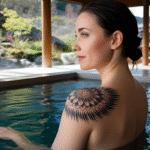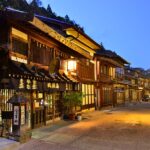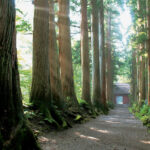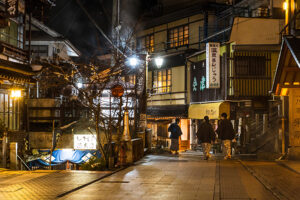
Tucked away in the mountains of Nagano Prefecture, Shibu Onsen is a nostalgic hot spring town where cobblestone streets, wooden ryokan inns, and the gentle scent of sulfur evoke Japan’s ancient spa culture.
Famous for its nine public baths and traditional atmosphere, this onsen village invites travelers to experience the Japan of a bygone era — a world of yukata robes, wooden geta clogs, and steaming bathhouses beneath the mountain mist.
Just minutes from the famous Jigokudani Snow Monkey Park, Shibu Onsen blends natural beauty, historic healing waters, and authentic local hospitality, making it one of Japan’s most atmospheric and culturally rich hot spring destinations.
A Thousand Years of Healing History
The origins of Shibu Onsen date back over 1,300 years, to the Nara Period (8th century), when a wounded warrior is said to have discovered its curative hot springs.
During the Edo Period, the town flourished as a rest stop for samurai and monks traveling along the Zenkoji Kaido route.
The area’s mineral-rich waters became famous for treating nerve pain, fatigue, rheumatism, and skin conditions, and many people came to “take the cure” by bathing in its multiple springs.
Even today, local residents continue this tradition, visiting the baths daily as part of their lifestyle and community ritual.
The Nine Public Baths (九湯めぐり – Kyu-tō Meguri)
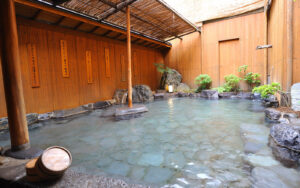
One of the highlights of Shibu Onsen is the “Nine Bath Pilgrimage”, a unique experience where visitors can soak in nine different public baths, each fed by a separate natural spring and believed to offer specific health benefits.
Each bath is small, cozy, and steeped in tradition — and every one has a number carved into its wooden entrance.
-
Ichino-yu (一の湯) – Eases gastrointestinal ailments.
-
Nino-yu (二の湯) – Relieves fatigue and helps muscle recovery.
-
Sanno-yu (三の湯) – Promotes smooth skin.
-
Yonnno-yu (四の湯) – Good for arthritis and neuralgia.
-
Gono-yu (五の湯) – Aids digestion and blood circulation.
-
Rokuno-yu (六の湯) – Helps with high blood pressure.
-
Nanano-yu (七の湯) – Improves joint pain.
-
Hachino-yu (八の湯) – Relaxes the body and mind.
-
Kono-yu (九の湯) – The most sacred, believed to bring spiritual and physical renewal.
Only guests staying at local ryokan receive a special wooden key that grants access to all nine baths.
Locals say that bathing in all nine brings good fortune and long life — a ritual known as “九湯巡り” (Kyu-tō Meguri).
Walking the Town in Yukata
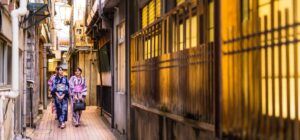
Part of the charm of Shibu Onsen is simply wandering its narrow lanes in a yukata (cotton robe) and geta (wooden sandals), moving from one bathhouse to another.
The town is lined with over 30 ryokan, many over a century old, their wooden façades glowing warmly under paper lanterns at night.
Steam drifts from vents in the street, and the rhythmic clack of geta on stone adds to the timeless atmosphere.
Everywhere you go, you’ll find onsen symbols, guardian statues, and hand-carved signs, preserving the aesthetics of Japan’s Taisho and early Showa eras.
Staying in a Traditional Ryokan
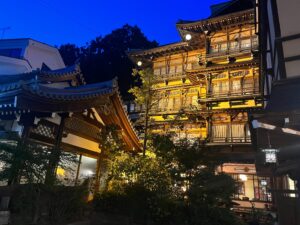
Shibu Onsen’s ryokan are among the most traditional in Japan, offering tatami rooms, futon bedding, and kaiseki (multi-course) dinners featuring local Nagano cuisine.
Many inns, such as Kanaguya Ryokan, are historical landmarks themselves — some claim to have inspired the bathhouse designs in Studio Ghibli’s “Spirited Away.”
Guests typically bathe in their inn’s private baths before venturing out to complete the nine-bath pilgrimage.
At check-in, you’ll receive:
-
A yukata and obi belt for wearing around town.
-
A wooden key to the public baths.
-
A bath towel and small map showing each bath’s location.
Some ryokan also offer private open-air baths (rotenburo) with views of the surrounding mountains — especially beautiful in winter.
Seasonal Beauty
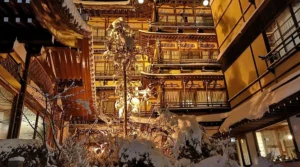
Shibu Onsen’s atmosphere transforms dramatically with each season:
-
Spring: Cherry blossoms bloom along the Yokoyu River, framing the town’s bridges and ryokan.
-
Summer: Lantern festivals and cool mountain breezes make evening strolls magical.
-
Autumn: Maple trees turn the valley vivid red and gold.
-
Winter: Snow blankets the rooftops, steam rises from the streets, and the world seems to slow down — a quintessential Japanese winter scene.
Winter also brings visitors heading to the nearby Jigokudani Snow Monkey Park, where wild monkeys bathe in natural hot springs — one of the world’s most iconic wildlife spectacles.
Local Cuisine
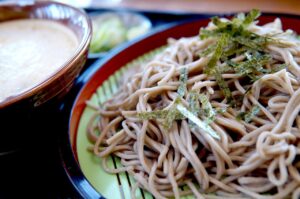
The cuisine of Shibu Onsen is deeply connected to the region’s mountains and pure water. Popular local dishes include:
-
Shinshu Soba (buckwheat noodles): A Nagano specialty served with wasabi and dipping sauce.
-
Onsen Manju: Soft steamed buns filled with red bean paste, sold fresh at street stalls.
-
Oyaki Dumplings: Handmade buns stuffed with seasonal vegetables or sweet bean paste.
-
River fish (ayu, iwana): Grilled with salt, often caught nearby.
-
Local sake: Brewed from pure spring water, perfect for a warm evening drink.
Many ryokan dinners feature seasonal mountain vegetables (sansai), wild mushrooms, and local beef or pork.
Etiquette for Bathing
Bathing in Shibu Onsen follows traditional Japanese customs:
-
Wash before entering the bath. Use soap and rinse thoroughly.
-
No swimsuits. Bathing is done nude.
-
Towels stay outside the water. Place them on your head or beside the tub.
-
Be quiet and respectful. The baths are for relaxation.
-
Tattoo policy: Some baths may ask guests with tattoos to cover them; check with your ryokan in advance.
Following local etiquette shows respect for the centuries-old culture of communal bathing.
Access
Location:
Shibu Onsen, Yamanouchi Town, Nagano Prefecture, Japan
By Train:
-
From Tokyo: Take the Hokuriku Shinkansen to Nagano Station (about 1.5 hours), then transfer to the Nagano Dentetsu Line to Yudanaka Station (about 50 minutes).
-
From Yudanaka Station, it’s a 5-minute taxi ride or 20-minute walk to Shibu Onsen.
By Car:
About 3 hours from Tokyo via the Kan-Etsu Expressway. Parking available near ryokan or municipal lots.
Hours and Fees
-
Public Baths: Open daily from roughly 6:00 AM – 10:00 PM (times vary slightly).
-
Access: Only open to ryokan guests (with wooden key).
-
Admission: Free for staying guests.
Why Visit Shibu Onsen
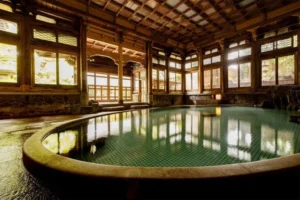
Shibu Onsen is not a theme park or resort — it’s a living hot spring village where history, tradition, and daily life blend seamlessly.
You can walk the same stone paths samurai once took, bathe in waters that have healed travelers for centuries, and experience genuine Japanese hospitality untouched by modern tourism.
Whether you come for the baths, the history, or simply the atmosphere of a mountain town lit by lanterns and steam, Shibu Onsen offers a rare chance to step back in time — and soak in Japan’s soul.
Related articles
Official Website
https://shibuonsen.net/en/
Accommodation sites
Agoda
